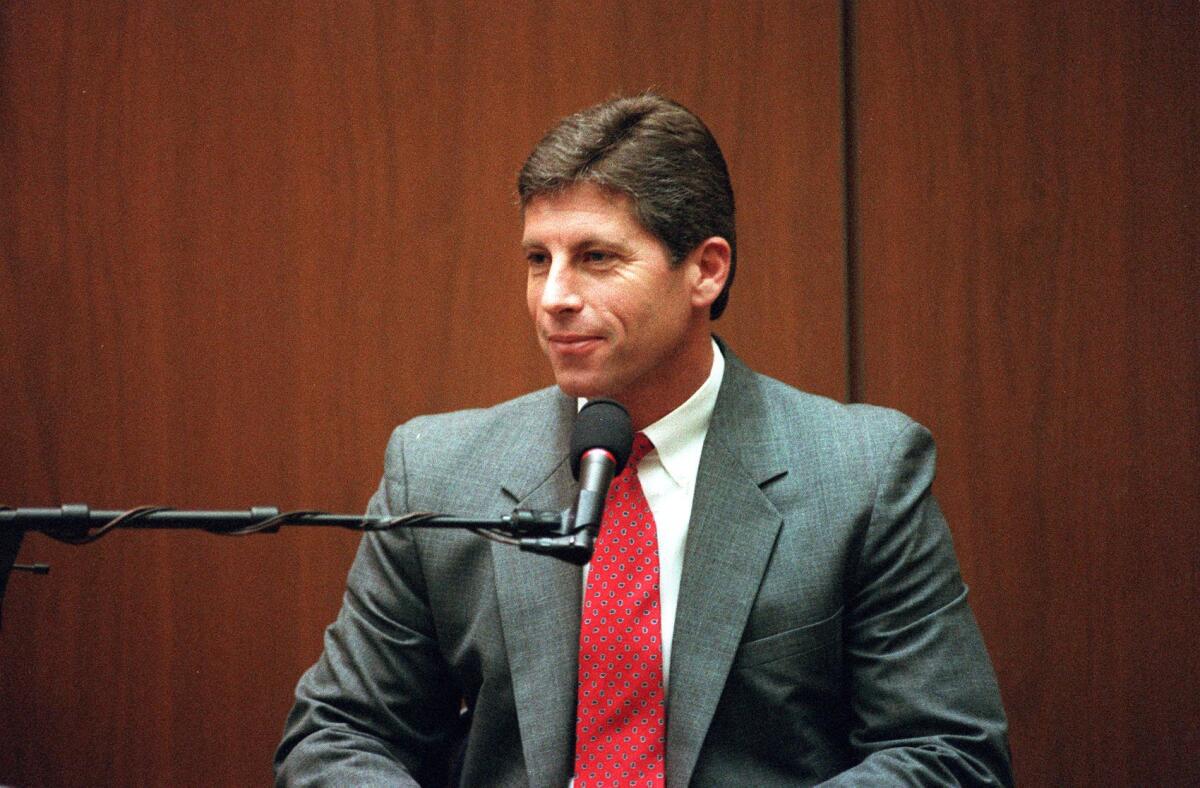It’s official: Mark Fuhrman can’t be a police officer in California

One month after the death of O.J. Simpson, state officials barred the Los Angeles Police Department detective most closely linked to Simpson’s failed prosecution from ever wearing a badge in this state again.
Mark J. Fuhrman was a key witness in Simpson’s trial for the murder of his ex-wife, Nicole Brown Simpson, in 1995, but his credibility was gravely wounded by racist statements he’d made as an LAPD officer. He retired in August 1995, while the trial was still in progress; a jury acquitted Simpson later that year.
Since then, Fuhrman has made a living writing crime-themed books, hosting a radio show in Spokane, Wash., for several years and appearing as a commentator on TV news programs; Fox News’ website lists him as “a forensic and crime scene expert for Fox News Channel.”
It’s not clear whether Fuhrman has any interest in returning to police work. Regardless, the California Commission on Peace Officer Standards and Training added Furhman in mid-May to the list of people ineligible to be certified in California as a law enforcement officer.
The reason cited: the state law that forbids law enforcement agencies from hiring people with felonies on their criminal record. Fuhrman pleaded no contest in 1996 to a felony perjury charge, which stemmed from his false testimony during the Simpson trial that he had not uttered a racial slur in the previous decade.
Fuhrman was one of 10 former LAPD officers and 17 former Los Angeles Sheriff’s Department deputies declared ineligible for certification based on their criminal records. Four deputies and one LAPD officer were listed as having their certifications revoked, most because of felony convictions.
Fourteen Los Angeles Sheriff’s Department deputies and seven LAPD officers were listed with temporarily suspended certifications, in most cases because they have criminal charges pending against them. For example, a temporary suspension was reported for Ricardo Castro, a deputy who was charged with murder in connection with a high-speed collision in a South Gate school zone that killed a 12-year-old boy.
Also listed with a suspended certification: Adrian Muñoz, an investigator with the L.A. County Medical Examiner accused of stealing jewelry and coins from two of the people whose deaths he was investigating.
The commission’s main role is to set standards for how law enforcement officers are recruited and trained, and to certify officers who meet those standards according to the level of training they’d completed. For many years, however, the commission had no way to revoke a certification, regardless of how egregious an officer’s actions might be. Nor was it allowed to keep track of officers who’d been fired for excessive use of force, falsifying records or other forms of malfeasance, allowing bad cops and deputies to bounce from one city to the next.
After years of pressure from police reform groups, state lawmakers passed Senate Bill 2 in 2021, requiring the commission to gather records of felonies and disqualifying misdemeanors by current and former peace officers. It also authorized the commission to suspend or revoke the certification of individuals it found unfit to serve as peace officers because of serious misconduct.
In effect, the measure turned the commission into a clearinghouse for information about which former police officers and deputies were not eligible to be hired in the state, either temporarily or permanently. And by law, the commission’s records on revoked or suspended certifications are available to the public.
According to the commission’s statistics, the state has almost 82,000 current full-time peace officers and 101,532 active peace-officer certifications. The commission has received more than 26,300 misconduct reports involving 16,617 officers — more than one-fifth the number of full-time officers — the bulk of which allege excessive use of force or biased enforcement.
Statewide, the commission has revoked 23 certifications and temporarily suspended 25 this year, it reported. An additional 30 officers voluntarily surrendered their certifications, and 64 other individuals were declared ineligible because of their criminal records.
More to Read
Sign up for Essential California
The most important California stories and recommendations in your inbox every morning.
You may occasionally receive promotional content from the Los Angeles Times.











